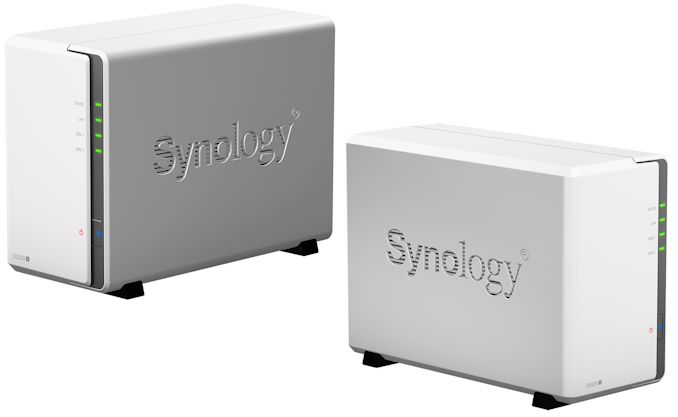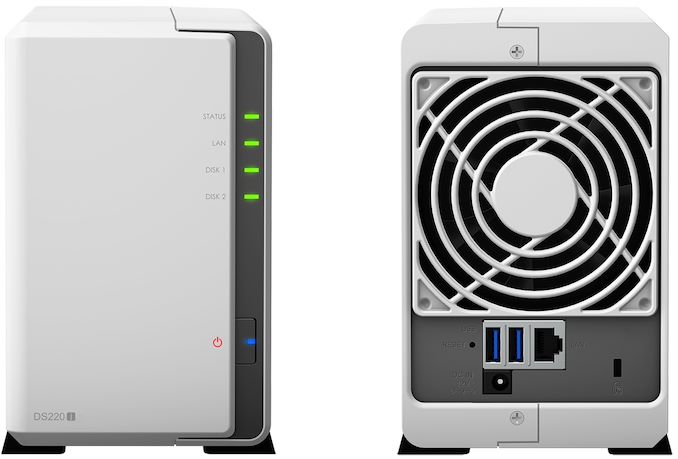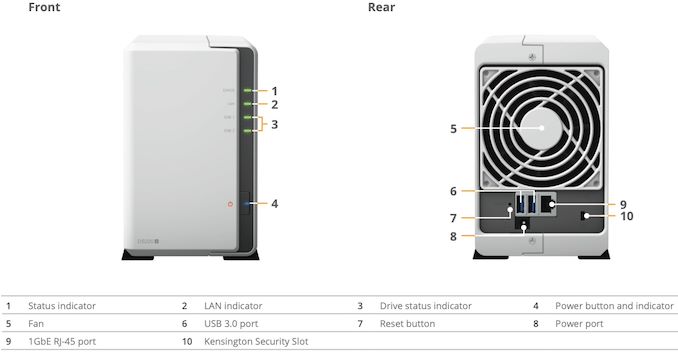Synology Unveils DiskStation DS220j Dual-Bay NAS: A Basic NAS For the Home
by Anton Shilov on March 17, 2020 2:30 PM EST- Posted in
- NAS
- Storage
- Synology
- Realtek
- DiskStation

Coming in on the heels of TerraMaster's recently introduced entry-level dual-bay NAS, Synology has announced its own basic NAS, the DiskStation DS220j. Synology's latest NAS can store up to 32 TB of data using modern hard drives, from which it can stream media, automatically backup data, and offers web-based access, covering all of the bases for an inexpensive NAS device.
The Synology DiskStation DS220j is based on Realtek’s quad-core RTD1296 system-on-chip, which is paired with 512 MB of DDR4 RAM. The NAS has two 3.5-inch bays (which can also house 2.5-inch devices), one GbE port, and two USB 3.0 Type-A ports. The DS220j can operate its drives in Synology Hybrid RAID (SHR), Basic, JBOD, RAID 0, or RAID 1 modes. Internally, the device uses the ext4 file system, but externally it supports ext4, ext3, FAT, NTFS, HFS+, and exFAT file systems. From performance point of view, the NAS is said to support sequential read/write speeds of ‘over 112 MB/s’.
The DiskStation DS220j can be accessed locally from PCs running Linux, macOS, or Windows, and it also supports automatic backup functionality, such as Apple’s Time Machine. Also, the Synology DiskStation Manager software supports various networking protocols, such as FTP, SMB2, SMB3 (encrypted), AFP, NFS, and WebDAV, so the data can be accessed from everywhere assuming that the NAS is connected to the Internet. Furthermore, the software supports cloud synchronization as well as such services as Dropbox, Google Drive, Microsoft OneDrive, Baidu, and Box.
Synology’s DiskStation DS220j will be available shortly. Pricing is unknown, but as we are dealing with an entry-level NAS, it shouldn't be too expensive.
Related Reading:
- TerraMaster F2-210 2-Bay Personal Cloud NAS Released
- QNAP Launches Two Bay TS-251D NAS: Gemini Lake, HDMI, PCIe Expandability
- Asustor, QNAP, and Synology Introduce New NAS Units at CES 2020
Source: Synology












24 Comments
View All Comments
p1esk - Tuesday, March 17, 2020 - link
I bought a Synology NAS more than 10 (!) years ago and it looks exactly like this. The specs and features are pretty much the same too. Zero progress...Last year I replaced it with QNAP TBS-453A, works great so far.
willis936 - Tuesday, March 17, 2020 - link
Why improve perfection? I use some fancy 10-bay rack-mount synology NASes at work and they are the most rock solid pieces of computer equipment I work with. They must be more than 10 years old and they only go down when the power’s out.ksec - Tuesday, March 17, 2020 - link
It is far from perfect the J line has been using the same Power unit for the past 10 years and they have been known to go out of services between 3-5 years. I am on my third one already.sandtitz - Tuesday, March 17, 2020 - link
My Synology 213j has been powered on for the last 6-7 years or so pretty much 24/7. Never had a single problem. I like the firmware policy, updates are still coming for this model.The single core 1.2GHz CPU is perfectly fine for modest file serving and some basic network services such as Radius, DHCP and Onedrive sync. I can't fully saturate the gigabit port but it was the cheapest 2-bay model when I bought it and I wasn't expecting more.
close - Wednesday, March 18, 2020 - link
This is a slightly cut down version of the DS218play (half the RAM and some of the media center features cut out). So you can expect the same kind of performance and reliability.close - Wednesday, March 18, 2020 - link
Addendum, also a lower equivalent (half the RAM, also cut down multimedia features) of the 2+ year old TS-228A.Thorburn - Wednesday, March 18, 2020 - link
If you know there is an issue with the power supply in the J then why do you keep buying them and not the Play or full-fat models? Avoid the issue and get a more powerful NAS at the same time?ksec - Wednesday, March 18, 2020 - link
I didn't, I bought a new PSU. Not a new NAS.edgineer - Wednesday, March 18, 2020 - link
Because transferring 29.1 TiB of data over gigabit Ethernet will take ~68 hoursclose - Wednesday, March 18, 2020 - link
In all honesty almost nobody looking at a bottom of the barrel (in Synology's lineup) 2 bay NAS cares about 2.5Gbps and up, or has the required infrastructure in place. 30TB of data is 60TB with redundancy (if redundancy is not important then 3 days copy time can't be that much either). You're looking at 4-8 bay NASes at the very least. Not really what we're talking about here.While I'd love a 2.5G/10G, cheap, 2-4 bay NAS, in reality many people just have high expectations that they don't want to back up with their wallet.